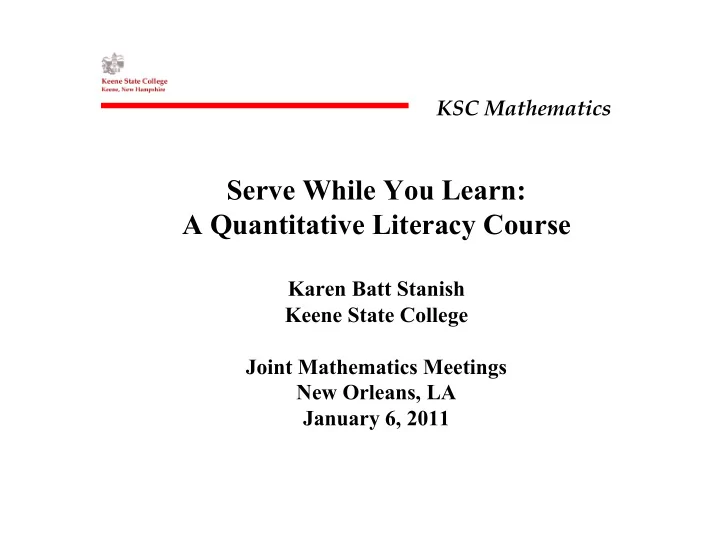

KSC Mathematics Serve While You Learn: A Quantitative Literacy Course Karen Batt Stanish Keene State College Joint Mathematics Meetings New Orleans, LA January 6, 2011
KSC Mathematics Quantitative Literacy A habit of mind manifested by knowledge of and confidence with numerical information. The ability to question, interpret, manipulate, and analyze numbers encountered in all aspects of life is the hallmark of a quantitatively literate person. (Keene State College)
KSC Mathematics Service-Learning A method under which students learn and develop through active participation in thoughtfully organized service experiences that meet actual community needs and course learning objectives. (Southern Vermont College)
KSC Mathematics IQL 101: Quantitative Literacy • General education course • Primarily first-year students • All students required to either take IQL 101 or another approved quantitative course • Most students in IQL 101 have a major without a quantitative component.
KSC Mathematics Quantitative Literacy Outcomes Students will: • Apply the basic methods of descriptive statistics, including both pictorial representations and numerical summary measures, to analyze data. • Use appropriate software to create spreadsheets, tables, graphs and charts. • Read and interpret visually represented data. • Apply acquired quantitative skills and concepts to describe, analyze, and interpret real-life data. • Distinguish among various types of growth models (e.g., linear, exponential) and the types of situations for which the models are appropriate. • Critically read and interpret a quantitative problem.
KSC Mathematics Early Sprouts Program • Developed by Dr. Karrie Kalich, Associate Professor of Health Science at KSC • Seed-to-table gardening and nutrition curriculum for preschool children • Family involvement • Pilot at KSC Child Development Center in 2006-2007 • More information available at www.earlysprouts.org
KSC Mathematics IQL Course Project • IQL students analyzed vegetable preference data from 31 preschool children who participated in the pilot • Created tables of counts and percents of children who liked and did not like each vegetable, as well as bar graphs of these percents, in Excel
KSC Mathematics Written Report • Brief description of Early Sprouts Program • Description of the data • Tables and graphs copied from Excel into Word • Written summary of data • Conclusion about the practical significance of the Early Sprouts program • At least one other piece of quantitative information an outside source that enhances report • Multiple drafts throughout the semester
KSC Mathematics Oral Presentation • Group presentation, one group for each vegetable • Students required to use PowerPoint or other quality visuals • Present tables, graphs, and summary for assigned vegetable • Students gave each other group participation grades
KSC Mathematics Making It Real for the Students • Dr. Kalich came to class as a guest speaker • Students visited the garden at the Child Development Center • Dr. Kalich attended the oral presentations • Never managed to incorporate all of these aspects in a single semester
KSC Mathematics Challenges and Next Steps • Took me more than one semester to “get the bugs out” of the project assignment • Some students produced incorrect results • Have not yet figured out how to get the class to produce one report that incorporated the best work of the class • Need new data for next time I teach the course
KSC Mathematics Student Comments about the Project “I feel the service-learning project is very beneficial and helped me understand the material.” “I was able to relate the math to real a life situation, the Early Sprouts Program.“ “I liked that it applied to real life.” “Good way to use nutrition as a math project.” “I loved going over to CDC and seeing all the kids interact with the veggies.”
KSC Mathematics Student Comments about the Course “I often see statistics relevant in the real world based on what I learned in this class.” “I learned a lot in this course and feel like I will use it in my everyday life.” “Incorporates different aspects of learning.” “Wow, this was actually a fun math class!” “I feel as though the Early Sprouts program could have been used more than it was.”
KSC Mathematics Questions? Karen Batt Stanish kstanish@keene.edu
Recommend
More recommend